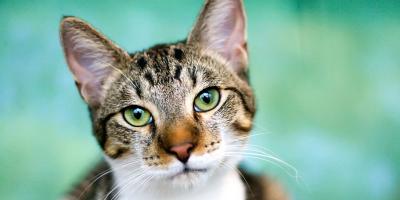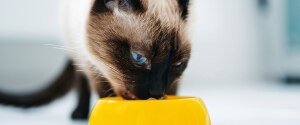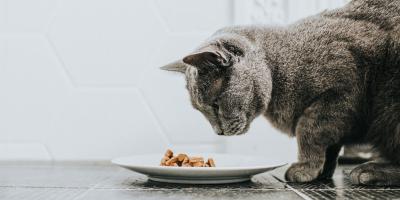
Why Is My Cat Always Hungry? 7 Reasons Your Cat's Appetite Has Increased

Is your cat meowing near the food bowl more than usual? Cats are often finicky eaters rather than food-obsessed felines, so it's normal to worry when your furry friend develops a never-ending appetite. In fact, many pet owners panic when something changes in their cat's routine, but there's often an explanation.
If you're wondering "Why is my cat always hungry?" you've come to the right place. We understand that when something changes with your cat, you may want immediate answers. That's why we've compiled the information below to help you understand what might be happening.
However, please keep in mind that it's best not to self-diagnose your furry friend if you notice appetite changes, regardless of whether the changes are sudden or gradual. A serious medical problem may exist, so schedule an appointment with your cat's vet ASAP for guidance. The vet can help you identify the root of your cat's increased hunger and make sure there are no underlying health conditions.
In the meantime, our article can provide some ideas to help you narrow down what's going on with your pet. From boredom to the natural aging process, here are seven reasons why your cat might be hungrier than usual.
1. Boredom
Have you ever caught yourself eating ice cream or chips out of boredom? Like humans, cats often chow down when they're bored. A cat that's always eating might not actually be hungry at all. If your cat constantly hangs out near her food bowl, she might feel like there's nothing to do except eat.
Luckily, this problem is easy to fix. Start by making sure your cat stays physically and mentally active. This is extremely important, especially if your furry friend spends most of her time inside.
Recreating the excitement of outdoor life is tricky for an indoor cat, but there are steps you can take to keep your kitty active. Keep your cat busy with interactive activities such as puzzle feeders and cat trees. We've got a handy article about how to play with cats if you need ideas for interacting with your feline friend.
2. Parasites
Your cat may eat constantly, but that doesn't mean she's satisfied. Intestinal parasites can impact your cat's food intake, making it difficult for your cat to get enough nutrients or calories. This may make your cat beg for food more often, but it can also make her appetite disappear.
This isn't an issue you can tackle on your own, at least not initially. Your cat's vet can perform diagnostic tests to figure out whether intestinal parasites exist. If they do, expect a prescription for deworming medication. Also, you may want to ask your vet whether preventive treatments are right for your cat. When administered correctly, these treatments may help prevent an infestation of worms and other parasites from developing.
3. Wrong Food
Your cat needs certain nutrients to thrive or you may end up constantly asking yourself, "Why is my cat always hungry?" When choosing a pet food, make sure it contains enough fats, vitamins, minerals, protein and carbohydrates for your kitty. We recommend you always offer your cat a balanced, complete diet of commercial pet foods appropriate for their age and lifestyle.
Many pet owners are unsure how much food their furry friend actually needs. If you need help figuring out what a healthy diet looks like, check out our informative article about feeding your cat. We've also got helpful tips about what not to feed your kitty.
4. Diabetes
Feline diabetes is a condition triggered by hormonal dysfunction. When a cat develops diabetes, it typically means there are issues with producing insulin or breaking it down correctly. It's harder for a cat to break down glucose for energy, which can trigger a significant appetite increase.
Other signs of feline diabetes include increased thirst and frequent urination. Watch for sudden behaviour changes, and contact a vet if you need help diagnosing or managing your cat's diabetes. Feline diabetes management typically involves daily insulin injections and a controlled diet of pet food geared toward your cat's needs.
5. Hyperthyroidism
Feline hyperthyroidism occurs when a benign tumour in the thyroid gland triggers excessive hormone production. Weight loss is one of the main symptoms. If you notice your furry friend is hungry all the time but still looks skinny, hyperthyroidism might be the culprit. Keep an eye on other symptoms, and make sure you get an official diagnosis from your cat's vet.
Additional signs of hyperthyroidism may include vomiting, panting or hyperactivity. Sometimes daily medication is enough to help manage this condition, but radioactive iodine therapy or surgery is recommended in some cases.
6. Cancer
Cancer leaves many pet owners asking, "Why is my cat always hungry?" Nutrients aren't always absorbed properly when a cat has cancer, so a cancerous kitty may crave more food to make up for the deficiency.
Feline cancer often requires an assortment of diagnostic tests, including blood work, ultrasound and an X-ray. This is because cancer symptoms often overlap with other conditions. Contact a vet immediately if you notice symptoms such as vomiting, lethargy, diarrhea or weight loss.
7. Aging
As your cat grows older, you may notice appetite changes. Your cat may develop a bigger appetite and crave treats more often.
Some medical conditions, including hyperthyroidism, affect older cats more often than younger ones. Before you blame your cat's age for appetite changes, rule out any major medical conditions with a vet. You can also get the facts about feeding your senior cat the correct amount of food in our helpful guide.
Pinpointing the cause of your cat's appetite changes can be tricky without a vet visit. Some underlying conditions that cause appetite changes are serious and require prompt medical attention. Sometimes hunger is the only sign that something is amiss.
Don't forget to watch your cat's health closely at all times, even if she hasn't recently changed her eating habits. Make sure your feline friend attends her annual health and wellness checkups, and reach out to the vet anytime a concern arises.
Related articles


